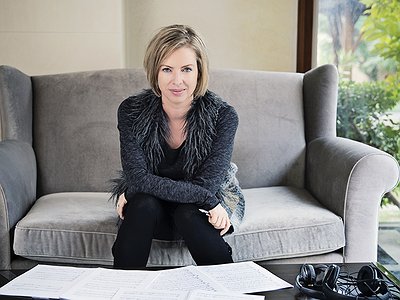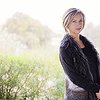Part 2
Take us through a day in your life, from a possible morning routine through to your work.
I wake up and have a black coffee around 7am, then get to my desk for 7:30am. If I can attempt some form of exercise in the morning, it helps my body and mind function better. I live in Dubai, and it gets so hot that exercising early in the day is crucial.
When I get started on my work, I find it easier to pick up something that I left unfinished from the previous day, as opposed to starting afresh so early in the morning. My best work usually comes later in the day when my mind has settled down.
I try to start with music in my day and avoid being sucked into emails and admin early on, as important as it is to keep on top of it all. Every day is slightly different but generally after lunch, I try to cover some admin or sort some scores (orchestrating, tidying up etc.). I often work into the evenings if I don’t have other family commitments, especially if I have a tight deadline when I keep going late into the night. It’s just the way it needs to be sometimes.
Could you describe your creative process on the basis of a piece, live performance or album that's particularly dear to you?
My new piece SEEN for the BBC Singers followed a pattern that seems to be frequently established in not only my creative process, but for many colleagues in the industry also. You take what feels like an age to come up with an idea, to only dismiss it, then repeat over and over until the deadline begins to loom.
By then, you’re sitting awake at 2am with your hair on fire feeling like your brain is a very thick toothpaste tube which you’re squeezing with all your might! However bad I’m making it sound, it’s actually a fairly energising process.
All composers tend to believe that their most recent work is their best, and we really have no perspective at all when we’re in the thick of working on a project. It’s more helpful, I find, to look back maybe six months to a year later, as you have the space and clarity to be objective.
Listening can be both a solitary and a communal activity. Likewise, creating music can be private or collaborative. Can you talk about your preferences in this regard and how these constellations influence creative results?
It’s a curious combination. Prompts that come from the outside can often lead to richer, much deeper ideas and directions one would not have found otherwise. If I am looking into a theme for a piece that relates to literature, art or history, I find conversations with experts in these fields invaluable.
Working in a completely solitary environment used to feel strange and uncomfortable, but these days it feels calm and allows my energy to be focused on the task in hand. I do find I need a lot of space, and once I work out what I want to achieve, I generally make it happen my own way.
Having said that, working with the incredible minds of Glen Scott (electronics producer) and Fiona Lindsay (lyricist) on my recent Radio 3 commission SEEN for the BBC Singers has been a really fantastic experience as we have each worked on a discreet element that enabled us to put our individual stamp on the work, contributing to the whole creatively but with our own areas carefully delineated
How do your work and your creativity relate to the world and what is the role of music in society?
The creative arts seem to nourish people’s minds in ways we don’t fully understand. Looking around, I see political themes emerging from music being written at the moment, particularly in American choral music and opera. I love the wild energy of these composers and value their deeply felt intentions to broaden people’s minds and experience but this has got me thinking about how music can so often undercut us.
We aim for one thing but end up with another. We don’t know how the person listening to our music is set up for the experience: maybe they experienced a great tragedy recently, maybe they have a need to escape from the hum-drum, maybe they want to be calmed or to be distracted from something.
With that in mind, the only thing we can really do as composers is be true to ourselves and to write what we feel we need to write, and people will take from it what they need. Because our best intentions to enlighten an audience can fall flat if they are not ready and open to it.
Art can be a way of dealing with the big topics in life: Life, loss, death, love, pain, and many more. In which way and on which occasions has music – both your own or that of others - contributed to your understanding of these questions?
Feelings like grief need to be properly processed. Art can be helpful with dealing with the biggest human experiences, but it’s impossible to be creative when you’re in the eye of a storm yourself. At that point, your mission is just to survive. Later, once fully digested, an artist can use those emotions and themes to develop their work.
I am in no doubt however, that having a good cry over a particularly moving piece of music is incredibly therapeutic.
There seems to be increasing interest in a functional, “rational” and scientific approach to music. How do you see the connection between music and science and what can these two fields reveal about each other?
People talk a lot about music and science being comfortable bedfellows.
For me, music is primarily a language and a form of expression so I haven’t explored the science side of music particularly. But what I do know from personal experience is that most composers come to a point where they would dearly like to escape the cliches of their own minds.
By cliches I mean things like the approaches to starting a piece, tendencies within the musical language, textures that come to mind. These are routes of thinking that can over time start to feel like overly-familiar tropes. And then we find ourselves spending much time straining not to be predictable!
One way to remove this predictability is by taking the composer out of the mix by adding in an external process. Composers have used puzzles, mathematical algorithms and specially devised computer programmes for this. What they all do is make some of the creative choices for you.
These alternative responses to a musical situation open up many more possibilities for composers and free them from the sense of being trapped in their own minds. I haven’t done it myself but the thought of it is highly appealing!
Creativity can reach many different corners of our lives. Do you feel as though writing or performing a piece of music is inherently different from something like making a great cup of coffee? What do you express through music that you couldn't or wouldn't in more 'mundane' tasks?
The incredible thing about art is that it can provide a prism for our thoughts and ideas through which we can access a deeper sense of meaning beyond ourselves.
A great cup of coffee can be many things, but it can’t do that.
Music is vibration in the air, captured by our ear drums. From your perspective as a creator and listener, do you have an explanation how it able to transmit such diverse and potentially deep messages?
Don’t physicists tell us that the whole universe, when we pull it apart, is inherently created from vibrations?
As a result of consistent exposure to music, just like with spoken language, we develop an understanding of the idioms that relate to certain states: joy, sadness, pain, elation, and so on. Our perception is informed by our culture and traditions: what we’ve been exposed to.
Regarding deep messages, I would refer back to my point about individuals taking things from art that they need. People who are looking for something in art will be more likely to find it.






